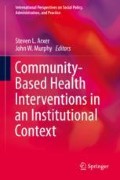Abstract
Jung Min Choi, John W. Murphy, Ramsey Dahab, and Charlene Holkenbrink-Monk, in this chapter, explore the issue of funding and budgeting. Often funds are directed to community organizations in ways that are either irrelevant or difficult to use. Additionally, budgets are formulated by agencies that are disconnected from the communities where services are needed. Community-based funding and budgeting, accordingly, are beginning to receive serious attention. Communities, accordingly, are given the latitude in some cases to establish budgets and spending strategies, along with identifying and pursuing sources of funds that are consistent ethically with these priorities and desires. Community-based funding and budgeting, in this way, are vital to supporting interventions in a community-sensitive manner.
Access this chapter
Tax calculation will be finalised at checkout
Purchases are for personal use only
References
Abers, R. (2000). Inventing local democracy: Grassroots politics in Brazil. Boulder, CO: Lynne Rienner.
Abers, R. (1998). From clientelism to cooperation: Local government, participatory policy, and civic organizing in Porto Alegre, Brazil. Politics and Society, 26(4), 511–523.
Baiocchi, G. (2005). Militants and citizens. Palo Alto, CA: Stanford University Press.
Baiocchi, G., & Ganuza, E. (2013). Participatory budgeting as if emancipation mattered. Politics and Society, 42(1), 29–50.
Barber, B. R. (1984). Strong democracy: Participatory politics in a new age. Berkeley, CA: University of California Press.
Berger, P., & Luckmann, T. (1967). The social construction of reality. Garden City, NY: Doubleday.
Bordo, S. (1987). The flight to objectivity. Albany, NY: SUNY Press.
Bauman, Z. (2008). Does ethics have a chance in a world of consumers? Cambridge, MA: Harvard University Press.
Cabannes, Y. (2004). Participatory budgeting: A significant contribution to participatory democracy. Environment and Urbanization, 16(1), 27–46.
Chavis, D. M., & Newbrough, J. R. (1986). The meaning of community in social psychology. Journal of Community Psychology, 14(4), 335–340.
Chomsky, N. (1999). Profit over people: Neoliberalism and global order. New York, NY: Seven Stories Press.
Cohen, J. L., & Arato, A. (1992). Civil society and political theory. Cambridge, MA: MIT Press.
Durkheim, E. (2001). The elementary forms of religious life. Oxford, UK: Oxford University Press.
Dussel, E. (1988). Ethics and community. Eugene, OR: Wipf and Stark.
Fals-Borda, O. (1988). Knowledge and people’s power. New York, NY: New Horizons.
Harvey, D. (2005). A brief history of neo-liberalism. Oxford, UK: Oxford University Press.
Herrnson, P. S., Deering, C. J., & Wilcox, C. (2013). Interest groups unleashed. Thousand Oaks, CA: Sage.
Jordan, B. (2016). Building student power through participatory budgeting. https://www.thenation.com/article/building-student-power-through-participatory-budgeting/
Kaplan, R. (1973). Some psychological benefits of gardening. Environment and Behavior, 5, 145–161.
Kasdan, A., & Markman, E. (2017). Participatory budgeting and community-based research: principles, practices, and implications for impact validity. New Political Science, 39(1), 143–155.
Katznelson, I. (2005). When affirmative action was white. New York, NY: W.W. Norton and Company.
Kleinman, A. (2010). Four social theories for global health. The Lancet, 375(9725), 1518–1519.
Land, K. C. (1983). Social indicators. Annual Review of Sociology, 9, 1–26.
Lerner, J. (2017). Conclusion: Time for participatory budgeting to grow up. New Political Science, 39(1), 156–160.
Lerner, J. (2014). Everyone counts: Could participatory budgeting change democracy? Ithaca, NY: Cornell University Press.
Lerner, J. (2011). Participatory budgeting: Building community agreement around tough budget Decisions. National Civic Review, 100(2), 30–35.
Levinas, E. (1998). Entre nous: On thinking-of-the-other. New York, NY: Columbia University Press.
Lewis, J. D., & Weigert, A. J. (1985). Social atomism, holism, and trust. The Sociological Quarterly, 26(4), 455–471.
Lune, H. (2010). Understanding organizations. Cambridge, UK: Polity Press.
Mathews, F. (1991). The ecological self. London, UK: Routledge.
Mijuskovic, B. (1992). Organic communities, atomistic societies, and loneliness. The Journal of Sociology and Social Welfare, 19(2), 147–164.
Minkler, M., & Wallerstein, N. (2011). Community-based participatory research: From processes to outcome. San Francisco, CA: Jossey-Bass.
Murphy, J. W. (2014). Community-based interventions: Philosophy and action. New York, NY: Springer.
Pape, M., & Lerner, J. (2016). Budgeting for equity: How can participatory budgeting advance equity in the United States? Journal of Public Deliberation, 12(2), 9. https://www.publicdeliberation.net/jpd/vol12/iss2/art9
Pateman, C. (1970). Participation and democratic theory. Cambridge, MA: Cambridge University Press.
Rappaport, J. (1981). In praise of paradox: A social policy of empowerment over prevention. American Journal of Community Psychology, 9(1), 1–15.
Sen, A. (1999). Democracy as a universal value. Journal of Democracy, 10(3), 3–17.
Sousa, B. (1998). Participatory budgeting in Porto Alegre: Toward a redistributive democracy. Politics and Society, 26(4), 461–509.
Souze, C. (2001). Participatory budgeting in Brazilian cities: Limits and possibilities in building democratic institutions. Environment and Urbanization, 13(1), 159–184.
Strauss, D. F. M. (2008). Atomism and holism in the understanding of society and social systems. Koers, 23(2), 187–205.
Taylor, C. (1985). Atomism. In Philosophical papers (pp. 187–210). Cambridge, UK: Cambridge University Press.
Thurow, L. C. (1981). Zero-sum Society. New York, NY: Penguin Books.
Wampler, B. (2007a). A guide to participatory budgeting. In A. Shah (Ed.), Participatory budgeting (pp. 21–54). Washington, DC: The World Bank.
Wampler, B. (2007b). Participatory budgeting in Brazil: Contestation, cooperation and accountability. University Park, PA: Penn State University Press.
Author information
Authors and Affiliations
Corresponding author
Editor information
Editors and Affiliations
Rights and permissions
Copyright information
© 2019 Springer Nature Switzerland AG
About this chapter
Cite this chapter
Choi, J.M., Murphy, J.W., Dahab, R., Holkenbrink-Monk, C. (2019). Community-Based Funding and Budgeting: Participatory Budgeting as a Transformative Act. In: Arxer, S., Murphy, J. (eds) Community-Based Health Interventions in an Institutional Context. International Perspectives on Social Policy, Administration, and Practice. Springer, Cham. https://doi.org/10.1007/978-3-030-24654-9_4
Download citation
DOI: https://doi.org/10.1007/978-3-030-24654-9_4
Published:
Publisher Name: Springer, Cham
Print ISBN: 978-3-030-24653-2
Online ISBN: 978-3-030-24654-9
eBook Packages: Behavioral Science and PsychologyBehavioral Science and Psychology (R0)

